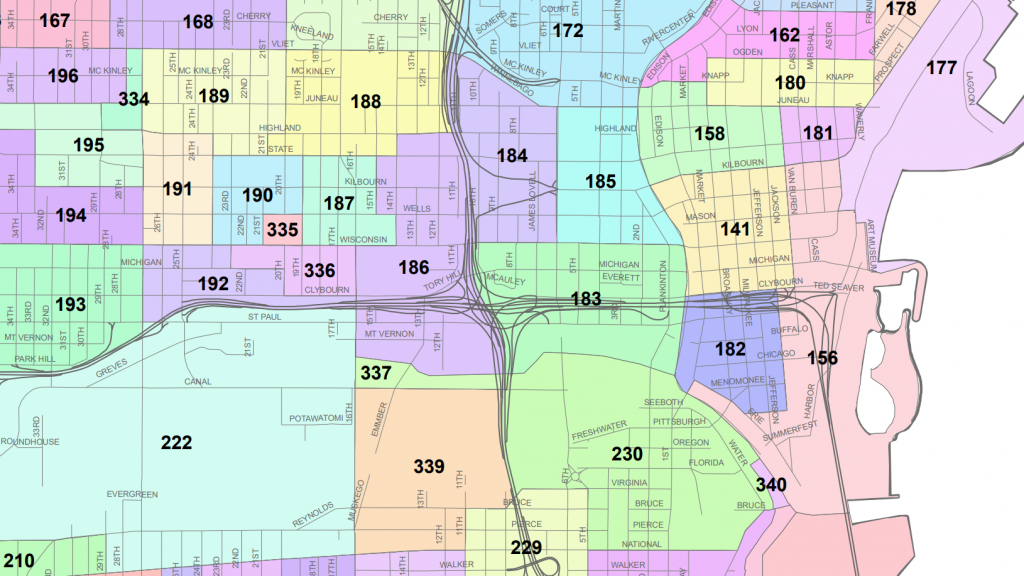Voting at Wisconsin’s Universities Isn’t Easy
Long lines and cumbersome ID requirements discourage students from voting.

Looking west down W. Wells St. at Marquette’s Campus Town Apartments. Campus Town East is the most visible. Photo by Jeramey Jannene.
It’s another presidential election year in America –and in Wisconsin— where debates around the youth vote have become as ritualistic as campaign ads and political yard signs.
Last spring in the aftermath of record turnout, a board member of the Milwaukee-based Bradley Foundation, Cleta Mitchell, lamented over the youth vote on college campuses across Wisconsin among other states. In a speech to donors, Mitchell, claiming it was far too easy for students to vote, stated “they just have to roll out of bed, vote, and go back to bed.”
As of November 2022, Wisconsin ranked as the 7th most difficult state to vote in according to the Cost of Voting Index, a measurement that analyzes all of the barriers to voting imposed by a state’s election laws. Perhaps nowhere else are these barriers more prominent than on Wisconsin’s college campuses, flushed with young people eager to participate in the democratic process but unfamiliar with the obstacles they will inevitably face as first-time voters.
Let’s examine my alma mater, Marquette University, as a case study.
Marquette University, a private college with an undergraduate population of around 7,500, is located just a few minutes drive from Milwaukee’s bustling Downtown. The university encompasses some of the densest voting wards and one of the most congested polling sites in the city with long lines forcing students to wait upwards of an hour or more to vote on election day. This is no fault of the Milwaukee Election Commission, an office that had fewer than 10 full-time staff members entering the 2022 Midterms and consistently experiences a shortage of poll workers year to year.
Marquette’s Alumni Memorial Union is a polling site housing three separate voting wards — wards 187, 190, and 335 — all largely composed of Marquette students. Because of the state voting requirements for college students, navigating the AMU on election day presents unique obstacles.
Every change of address, whether across the city or across the hall, requires re-registration in order to vote. College students change mailing addresses far more frequently than the general population as they move from one dormitory or apartment to another in between academic years, meaning college students in Wisconsin – should they choose to vote on campus on election day as most do at Marquette— must reregister at their polling location. Last April, amid a highly contested state Supreme Court race, the AMU possessed only one registration table on election day despite serving three voting wards composed largely of individuals requiring re-registration. The line to register for much of that day was, unsurprisingly, long.
There are also four polling sites catering to students living on or immediately around Marquette’s campus. In many instances, a student could move across the street and into a new voting ward unbeknown to themselves until they arrive at their former polling site, wait in long lines in the attempt to register and vote, only to find their new polling site is blocks away.
There is also the issue of a qualifying state-issued ID, the other documentation beyond proof of residency required to register and vote. The majority of Marquette University’s undergraduate population is composed of out-of-state students, meaning that most voters on Marquette’s campus will need to utilize a Student Voter ID issued by the University come election season. As of 2011, such an ID must include a signature of the student and a date of expiration no later than two years following the ID’s issuance, regardless of whether the issuing institution is a four-year university like Marquette.
Many more students do not realize their Marquette Voter ID expires after just two years – more than likely the anniversary of the last election they voted in on campus. In effect, even if students arrive at the correct locations to register and vote, many will have to make additional trips to wait in additional lines for a suitable form of ID.
In consideration of these challenges, many proclaim early and absentee voting as the solution. These options may initially seem intuitive but in many cases, students only choose to vote early or absentee in retrospect of the inconveniences they faced voting previously on campus on election day. This hindsight, however, is not a luxury first-time voters in the state enjoy, including most of Marquette’s underclassmen.
Moreover, a growing body of research suggests emphasizing early and absentee voting rather than election-day voting does not engage new voters. Rather, by emphasizing these options, already likely voters who would have otherwise cast their ballot on election day simply vote at an alternative date in greater numbers. Interestingly, that ultimately leads to lower overall turnout. Experts from the Elections Research Center at the University of Wisconsin-Madison theorized in 2014 that early voting reforms depress the “stimulating effect” of election day. The probable explanation is that when fewer individuals, especially seasoned voters familiar with election protocols, have any intention of voting on election day, they are less inclined to engage others in the electoral process, thereby diminishing turnout.
In fact, the on-campus voting experience at Marquette is so universally impractical, that in 2023, students across the political spectrum organized a proposal calling upon the university to suspend classes on election days. The proposal, authored by a pair of students including myself, was passed by Marquette’s Student Senate in a unanimous vote and endorsed by various student organizations including Marquette’s Chapter of Young Americans for Freedom and the Marquette College Democrats among others. The proposal then became a referendum open to the entirety of the undergraduate student body, eventually passing by a sweeping margin of 93%. Following the referendum, the proposal was referred to the University’s Board of Undergraduate Studies for consideration where it was ultimately determined a change in the academic calendar for the purpose of election accessibility presented too great of an administrative burden to implement.
Students at Marquette now find themselves in the same condition in which they started: waiting in long lines to register and vote, some missing classes in the process, at understaffed polling sites overseen by an election commission also understaffed and underfunded. They vote on and around a university unfit, or unwilling, to solve this problem within a state governed by far too many legislators who view the participation of college students in the democratic process as an indulgence –something to be experienced, but only in moderation.
Students in Wisconsin vote not because of the simplicity of the process, but in spite of its complexity. Young people are turning out in greater numbers because they are willing and eager to educate themselves and others on the voting process.
The implicit grievance many loud voices, like Ms. Mitchell, have with young people is not the increasing numbers in which they vote, but what and who they increasingly vote for. That is an issue of platform, not election policy. Claiming otherwise and, more importantly, legislating otherwise, is a disservice to all voters.
It’s time for a change in narrative.
If you think stories like this are important, become a member of Urban Milwaukee and help support real, independent journalism. Plus you get some cool added benefits.
Op-Ed
-
Wisconsin Candidates Decry Money in Politics, Plan to Raise Tons of It
 Dec 15th, 2025 by Ruth Conniff
Dec 15th, 2025 by Ruth Conniff
-
Trump Left Contraceptives to Rot; Women Pay the Price
 Dec 8th, 2025 by Dr. Shefaali Sharma
Dec 8th, 2025 by Dr. Shefaali Sharma
-
Why the Common Council’s Amended Budget is Good Policy for Milwaukee
 Nov 20th, 2025 by Alds. Marina Dimitrijevic and Russell W. Stamper, II
Nov 20th, 2025 by Alds. Marina Dimitrijevic and Russell W. Stamper, II























surprised that the Student Senate and the other 2 groups mentioned aren’t shifting strategy (after the voting day suspend class idea didn’t pass) to inform students about the rules and to assist the resident halls with a coordinated effort to get students registered properly, inform students how to get a free WI State ID from the DMV, and to volunteer as poll workers.
This should be a simple fix. These are educational facilities, whose primary focus is to educate. Send all of the information necessary to vote to their phones. I guarantee they will see the information if it is distributed that way. What each student does with that information is then up to them.
There are three Constitutional Amendments establishing and protecting the right of citizens to vote in addition to the Voting Rights Act of 1965. Yet States with Republican legislative majorities continually look for ways to suppress the vote or deny citizens the opportunity to vote. When there issues are raised, we hear the “States Rights” argument which unfortunately the partisan courts which claim to follow the original intent of our Constitution ignore this basic right while going out of their way to find justification to lift most any restriction on the right to bear arms.